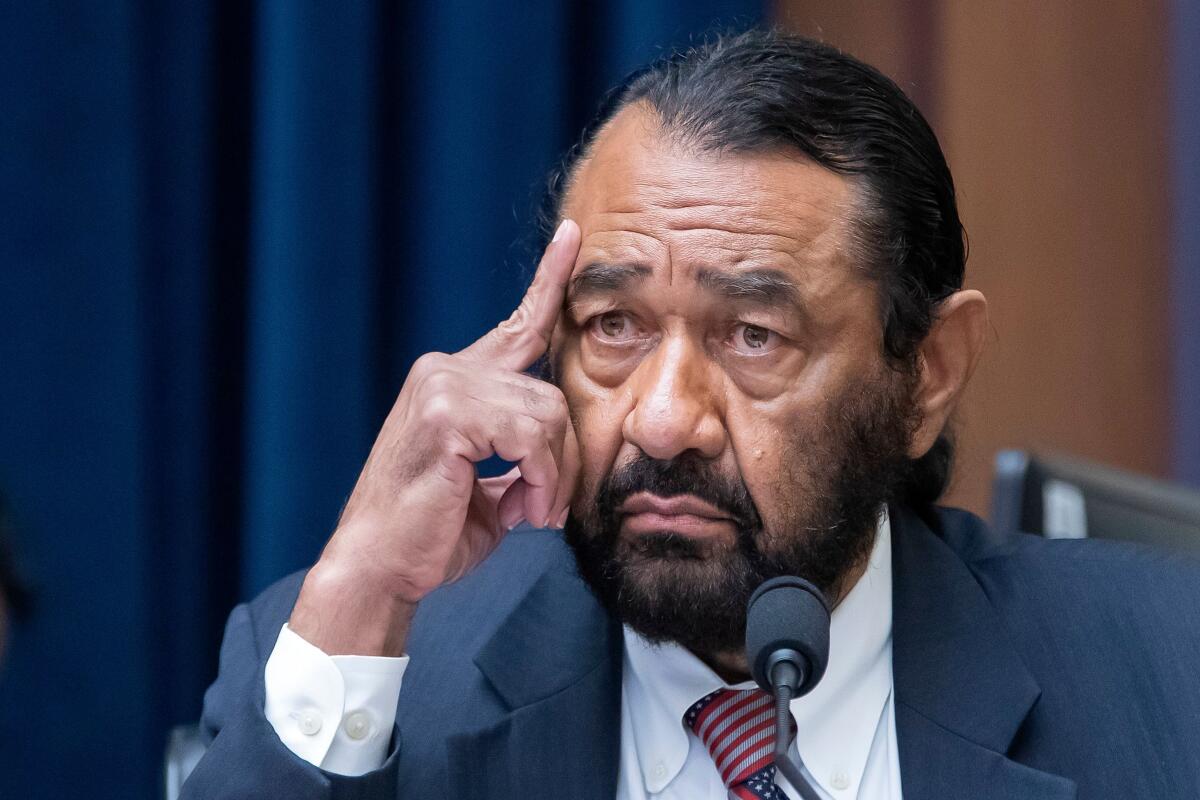House rejects effort to force vote on impeaching President Trump

- Share via
WASHINGTON — House Democrats rejected an attempt Wednesday to force a vote on impeaching President Trump, showing that anger and frustration over the president’s racist tweets and other actions have not yet convinced a majority to push for his removal.
The clash over impeachment came shortly before Democrats voted to hold in contempt Atty. Gen. William Barr and Commerce Secretary Wilbur Ross for refusing to comply with congressional subpoenas seeking information about why the Trump administration wanted to add a citizenship question to the 2020 census.
It marked the first time the full House held members of Trump’s Cabinet in contempt since Democrats took over the chamber in January, and it came days after Trump announced he would give up his battle to use the census for what critics said was an effort to cut federal support for immigrant-heavy, largely Democratic districts.
The conflicting votes Wednesday thus reflected how far Democrats are willing to go — at least for now — as they confront Trump over an array of legal and political disputes, from getting access to his tax returns to oversight of security clearances at the White House.
They’ve struggled to pry documents and witnesses out of the Trump administration for congressional investigations, issuing subpoenas and going to court. But they’ve shied away from seeking impeachment, even while harshly denouncing the president.
On Tuesday the House passed a resolution, largely on party grounds, that “strongly condemned” Trump for telling four liberal members of Congress, all women of color and all U.S. citizens, to leave the country.
Although Speaker Nancy Pelosi (D-San Fransisco) strongly backed that resolution, she has pushed back against efforts to start impeachment proceedings against the president, in part because of concerns it would backfire against Democrats in the 2020 election.
Rep. Al Green (D-Texas) tried to force a vote on impeaching Trump anyway on Wednesday, introducing a resolution that called him “unfit to be president” and calling for his removal. For procedural reasons, the House was forced to consider — or derail — the resolution within two days.
Trump has “brought the high office of the president of the United States in contempt” and “sown seeds of discord among the people of the United States,” Green wrote.
He cited Trump’s racist tweets telling the four lawmakers to “go back” to the countries “from which they came.”
The House could have voted to proceed with the measure, formally opening a debate on the floor over whether the president should be impeached, but Pelosi and other Democrats helped block the effort. The measure was tabled by a bipartisan vote of 332 to 95, effectively killing it.
Green said he considered his effort worthwhile because 95 Democrats voted against sidelining his resolution, an increase over the two times he has previously tried to force a vote on impeachment.
“Whether we got 95 or 5, the point is we have to make a statement to the American people that there are some among us who believe that this president is unfit and should be impeached,” he said after the vote.
Trump hailed the vote as “overwhelming.”
“That’s the end of it,” he told reporters after landing in Greenville, N.C., for a political rally.
Despite the vote, impeachment is gaining traction among some Democrats and emerging as a divisive issue in the party. Several Democrats running for president, including Sens. Kamala Harris of California and Elizabeth Warren of Massachusetts, have urged Congress to start impeachment proceedings.
Pelosi has warned that an impeachment probe could draw attention away from Democrats’ policy goals, energize Trump’s supporters and ultimately be thwarted by the Republican-controlled Senate, which almost certainly would not vote to convict the president.
Green’s resolution did not address the investigation led by former special counsel Robert S. Mueller III, who uncovered multiple episodes where Trump tried to limit or block the investigation into whether Trump or his aides assisted Russian interference in the 2016 election. Some 34 people ultimately were charged or indicted, but no Americans were accused of conspiring with the Russians.
Mueller is scheduled to appear on Capitol Hill next Wednesday and his testimony — his first since the redacted version of his report was released in mid-April — could spur other Democrats to call for impeachment.
Green’s resolution cited the House vote to censure Trump for his racist tweets about four freshmen lawmakers: Reps. Alexandria Ocasio-Cortez (D-N.Y.), Ayanna Pressley (D-Mass.), Ilhan Omar (D-Minn.) and Rashida Tlaib (D-Mich.).
Ocasio-Cortez was among those who voted for Green’s resolution, and she described Trump’s presidency as an emergency that needs to be addressed by removing him from office.
“I think that each day that passes our democracy, our institutions, are imperiled,” she said.
The House later voted 230 to 198 to hold Barr and Ross in contempt for refusing to comply with subpoenas regarding next year’s census.
In June, the Supreme Court ruled 5 to 4 that the reason Ross had provided for adding the citizenship question — to help enforce the Voting Rights Act — was “contrived.” The justices blocked the Commerce Department from adding the question unless administration officials could provide a more compelling rationale.
Critics say the administration sought to suppress census turnout in Democratic-majority states like California, where large immigrant populations would be afraid to respond. That would lead to a drop in congressional seats and federal funds for those states.
The House Reform and Oversight Committee voted last month to advance the contempt resolution to the full House after Barr and Ross declined to share documents detailing the rationale for the citizenship question. The contempt citation will be automatically referred to the U.S. attorney’s office in Washington, D.C., for prosecution, but Barr oversees that office so it is unlikely to proceed.
White House Press Secretary Stephanie Grisham blasted the contempt vote. “House Democrats know they have no legal right to these documents, but their shameful and cynical politics know no bounds,” she said.
It’s more likely that Democrats intended the contempt vote as a symbolic gesture meant to show their disapproval. They could also turn to the courts for help in enforcing their subpoenas.
Lawmakers voted in June to authorize legal action to make Barr and former White House Counsel Don McGahn testify after they refused House Judiciary Committee subpoenas related to the Russia investigation.
Democrats stopped short of holding them in contempt, however. Trump claimed that executive privilege prevented the witnesses from complying with congressional subpoenas in both cases.
More to Read
Get the L.A. Times Politics newsletter
Deeply reported insights into legislation, politics and policy from Sacramento, Washington and beyond. In your inbox three times per week.
You may occasionally receive promotional content from the Los Angeles Times.










